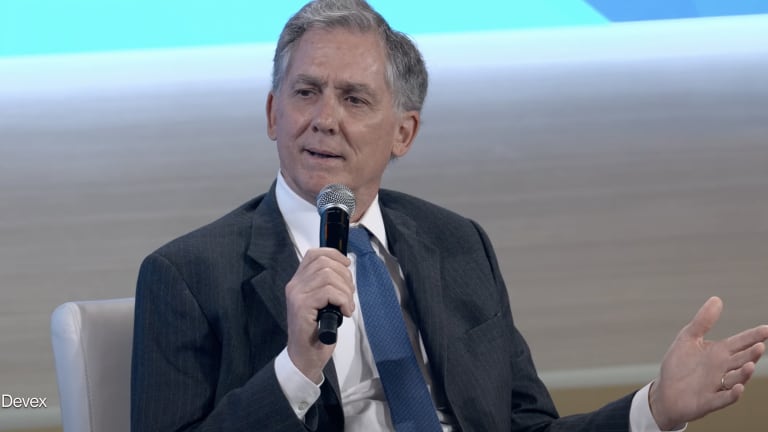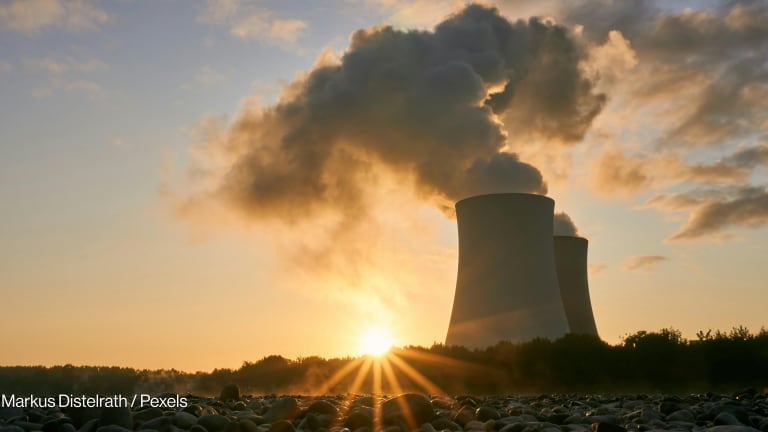'Keys to the Latin Bank': How an American president could influence development at IDB
Some countries in Latin America must consider the politics at play and how leadership could impact future financing from the Inter-American Development Bank.
WASHINGTON — For the first time, the United States has nominated an American to be president of the Inter-American Development Bank, challenging precedent at an institution that has always been led by someone from Latin America. The nomination of Mauricio Claver-Carone, White House National Security Council senior director for Western Hemisphere Affairs, came as a surprise to the region, where at least two countries had already floated names for consideration to replace current bank President Luis Alberto Moreno. The Colombian has led IDB since 2005 and is only the institution’s fourth president in its 60-year history. “It’s going against tradition, against diplomacy, against the real will of many of the partners in the IDB,” said Mauricio Silva, former IDB executive director for El Salvador, of nominating an American. “I am convinced that the economic development of the region depends on the region itself mainly. But the U.S. — it's the main partner.” This means that some countries in Latin America must consider the politics at play and what it means for their future bank financing as they consider their support for an American IDB president, said Silva, who worked at IDB for 20 years and also served as the board director for Central America. Nominating an American sets a bad precedent, and is “imperialist,” he said, noting that countries should be allowed to dictate their own development agenda led by a president from the region. “The sole role of the institution is to foster development in Latin America and the Caribbean. So let us do what we need to do. Let us Latin Americans and Caribbeans decide our priorities.” --— Leonardo Paz, analyst, International Intelligence Unit, Getulio Vargas Foundation Argentina and Brazil, two countries with vastly different political landscapes, both had candidates in mind to lead IDB before the Trump administration announced Claver-Carone’s nomination. Leonardo Paz, analyst with the International Intelligence Unit at the Getulio Vargas Foundation in Brazil’s Rio de Janeiro, said the region was “blindsided.” “The sole role of the institution is to foster development in Latin America and the Caribbean. So let us do what we need to do. Let us Latin Americans and Caribbeans decide our priorities,” Paz said. “It’s taking power from us and trying to decide what’s going to be our fate … It’s like saying that you know better what’s better for us.” But Brazil quickly endorsed Claver-Carone, who has pledged to serve one 5-year term. So did Colombia and Ecuador, already giving the U.S. — which owns one-third of the Washington-based IDB’s shares — 45% of the vote of the bank’s 48 members. An American-led bank could mean a shift of the institution’s development lending to its 26 borrowing countries, as well its use as a tool to counter China’s development priorities in the region, analysts say. Using IDB to counter China For smaller countries, this can be a particularly stark choice, Silva said. This includes the “Northern Triangle,” where Guatemala, El Salvador, and Honduras have faced cuts of U.S. bilateral foreign assistance over complaints they have not done enough to stem migration from their countries to the U.S. border. They would not be eager to see IDB lending priorities similarly restricted, Silva said. “All of them are in a very difficult position,” Silva said of Northern Triangle countries. “And having the pressure of the U.S. even without the COVID, they were ready to support [Claver-Carone’s nomination],” Silva said. “For the small countries, hundreds of millions of dollars are very significant, as compared for what they mean for a big country or a middle-sized country. Even for Colombia, $500 million, it’s not that significant. $500 million to any of the Central American countries is very significant.” Claver-Carone, who is Cuban-American, has served previously in the U.S. Treasury Department and at the International Monetary Fund. He’s hawkish on Cuba, Venezuela, and Nicaragua, but his presidency wouldn’t likely mean much of a shift for bank policies with regard to those countries, said Fernando Cutz, Claver-Carone’s predecessor at the NSC. Cuba is not an IDB member, and the region has largely coalesced around the view that socialist Venezuelan President Nicolás Maduro must step down. Venezuela’s economy has tanked, leading to a shortage of basic goods such as food and medicine, and inflation is at nearly 10,000%. The economic and political collapse have sent more than 5 million migrants and refugees fleeing the country, most spreading throughout the region. Supporting their health, education, and livelihoods while dealing with their own domestic challenges — now compounded by COVID-19 — has become a major humanitarian and development crisis for host countries. Many Latin American countries have recognized opposition leader Juan Guaidó as the rightful president of Venezuela, and last year IDB did the same. Maduro’s representative was removed from the bank against protests from China, which holds a just .4% share. The issue led to the cancellation last year of the bank’s planned annual meetings in China. “Clearly the U.S. is the most powerful member of the IDB by most measurements. But I think it’s important from a regional perspective that we allow there to be leadership from the region, be sure we don’t impose our will, especially with the history that we have of neocolonialism,” Cutz said. “The IDB has already been on our side when it comes to Venezuela, when it comes to Cuba. So I think the only real kind of tangible impact beyond the very important symbolic impact, which I think is a huge net negative, is the fact that I imagine the bank will be pushed away from China so that the U.S. can have more influence over it.” China’s development model, which U.S. officials routinely refer to as “debt trap diplomacy,” largely uses Chinese companies and workers to construct large infrastructure projects that must then be paid for at high interest rates. The U.S. argues this leaves countries deeply indebted to China, something a Latin American region that was already struggling economically before the COVID-19 pandemic hit can hardly afford. “IDB [will have] a very large role in Latin America in the next few months to years because of the huge crisis that we have here in the region. We are performing very badly towards countering the threat of the pandemic,” Paz said. “[Trump will] have some influence on how IDB in the future will direct funds, so [he] might use it as a political tool to gain leverage in certain negotiations in the region.” ‘Quick, dirty growth’ An IDB spokesperson declined to comment on Claver-Carone’s nomination, which is not the first controversial pick Trump has made to lead a multilateral development bank, nor was it the first time he was suspected of using the multilateral system to counter China. Last year, Trump nominated David Malpass to be president of the World Bank, which has traditionally been led by an American. Initial fears over deviations he could make from the World Bank’s development agenda, particularly when it comes to climate change, have thus far been unfounded. “The preference of the region is always going to be with the U.S., if you have to choose between [the] U.S. and China, right? But the region has been saying ‘Don't make me choose. I don’t have to choose,’” Silva said. “Our main partner — especially for Central American and for the smaller countries — has been the U.S., and that’s hopefully going to continue.” Now that it seems likely the U.S. candidate will garner enough votes, Brazil is reportedly vying for the vice presidency — a position that has typically gone to an American. Holding 11.4% of IDB’s shares and with the largest economy in Latin America, Brazil is less reliant on bank loans to finance its development. The bank’s work on sustainability and the environment could be dramatically altered if Brazil gains the vice presidency under Claver-Carone, according to Center for Global Development Senior Fellow Nancy Birdsall. “Were he elected and the executive vice president were to be Brazilian, it would no doubt in some deep institutional way [signal that Brazil President Jair] Bolsonaro’s priority is quick, dirty growth. Not sustained and not inclusive growth,” Birdsall said. IDB last received a capital increase in 2010, and Claver-Carone has pledged to secure one during his term from the U.S. Treasury Department. A former IDB official, speaking on the condition of anonymity, said that even though countries in the region have been seeking a capital increase for years, there’s reason to be skeptical. “How is it that the Americans come and ask for the keys to the 'Latin Bank' and more than a dozen countries in the region simply oblige?” the former official asked. “Is this due to economic vulnerability or simply fear of the Trump administration?”
WASHINGTON — For the first time, the United States has nominated an American to be president of the Inter-American Development Bank, challenging precedent at an institution that has always been led by someone from Latin America.
The nomination of Mauricio Claver-Carone, White House National Security Council senior director for Western Hemisphere Affairs, came as a surprise to the region, where at least two countries had already floated names for consideration to replace current bank President Luis Alberto Moreno. The Colombian has led IDB since 2005 and is only the institution’s fourth president in its 60-year history.
“It’s going against tradition, against diplomacy, against the real will of many of the partners in the IDB,” said Mauricio Silva, former IDB executive director for El Salvador, of nominating an American. “I am convinced that the economic development of the region depends on the region itself mainly. But the U.S. — it's the main partner.”
This story is forDevex Promembers
Unlock this story now with a 15-day free trial of Devex Pro.
With a Devex Pro subscription you'll get access to deeper analysis and exclusive insights from our reporters and analysts.
Start my free trialRequest a group subscription Printing articles to share with others is a breach of our terms and conditions and copyright policy. Please use the sharing options on the left side of the article. Devex Pro members may share up to 10 articles per month using the Pro share tool ( ).
Teresa Welsh is a Senior Reporter at Devex. She has reported from more than 10 countries and is currently based in Washington, D.C. Her coverage focuses on Latin America; U.S. foreign assistance policy; fragile states; food systems and nutrition; and refugees and migration. Prior to joining Devex, Teresa worked at McClatchy's Washington Bureau and covered foreign affairs for U.S. News and World Report. She was a reporter in Colombia, where she previously lived teaching English. Teresa earned bachelor of arts degrees in journalism and Latin American studies from the University of Wisconsin.








